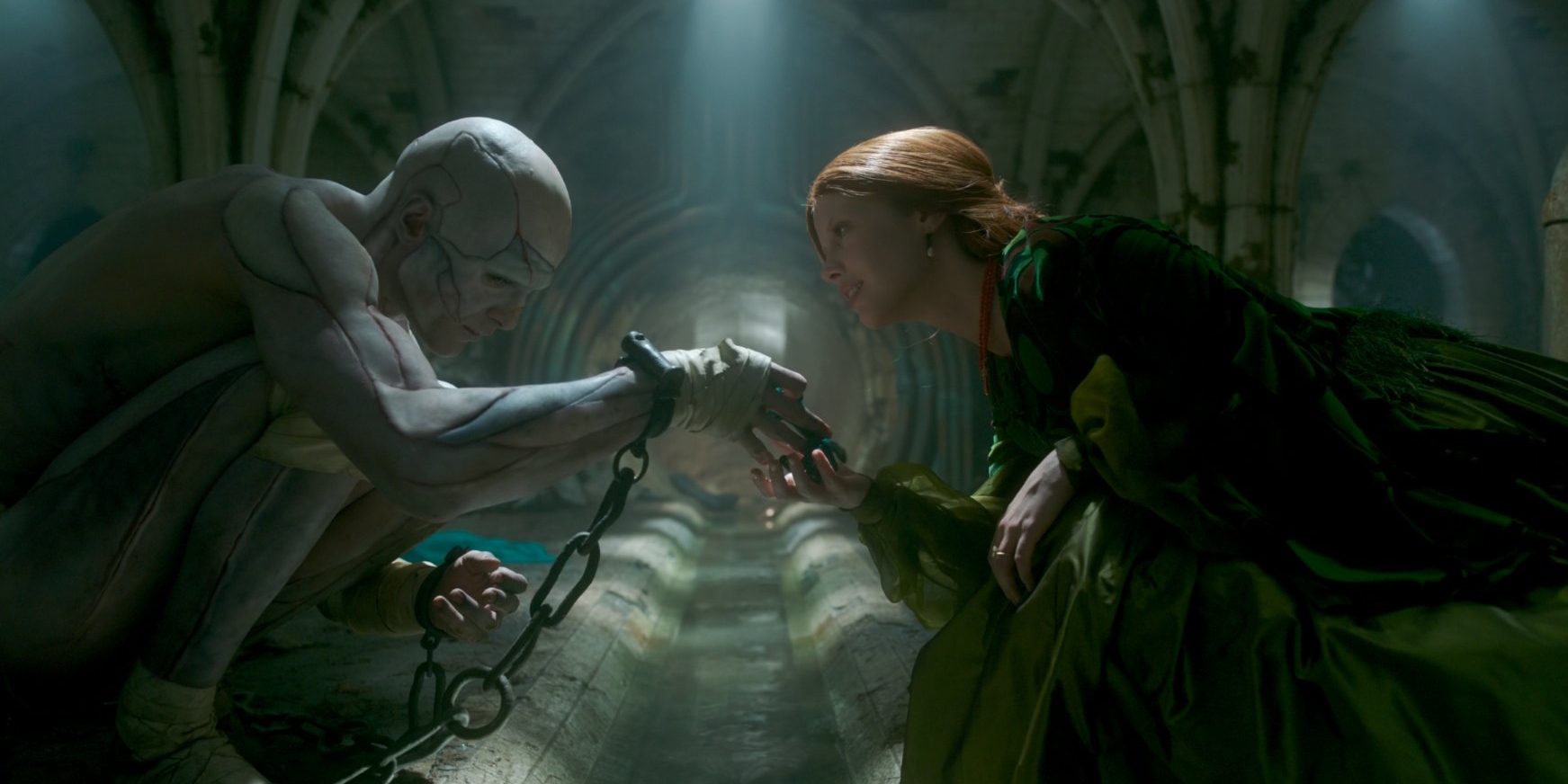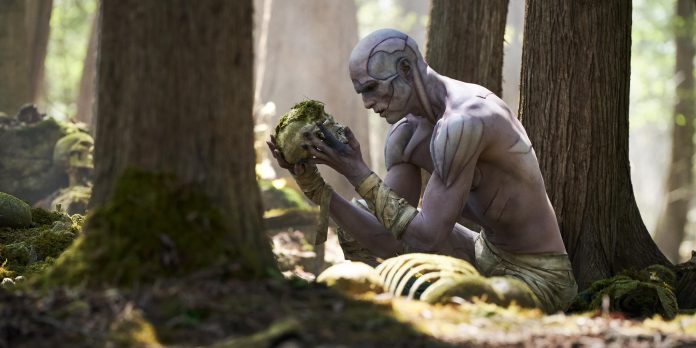Sofia Coppola was onto something special when she cast Jacob Elordi as Elvis Presley in her dreamlike film, “Priscilla.” Elordi’s version of Elvis is intensely charming and spellbinding. His charisma has a gravitational pull on his surroundings. There’s also something menacing and nightmarish about Elordi’s portrayal. He brings a haunting understanding of how Elvis makes power seem so beguiling, luring Priscilla (Cailee Spaeny) into a relationship and only seeing her through the lens of how he defines her. Looking back on “Priscilla,” the combination of Elordi’s towering rage and vulnerability, not to mention those soulful eyes, very much feels like an ‘a-ha’ moment. A moment that would speak to the precise level of emotional range needed for embodying the tragic figure of Mary Shelley’s “Frankenstein.”
It was only a matter of time before Guillermo del Toro, our passionate father of empathetic creatures, would reimagine this gothic classic for the big screen (thankfully, the film was given a theatrical run). “Frankenstein” was del Toro’s passion project for many years, to the point where its fundamental themes spilled into other films like “Cronos” and “Hellboy.” Del Toro’s profound relationship to Shelley’s novel became so intimately woven that his interpretations of the iconic characters in “Frankenstein” feel like personal extensions of him. And in true del Toro fashion, his film explores Victor (Oscar Isaac) and the creature (Jacob Elordi) as mirror images of a father-son relationship; both carry the spirit of a traumatized inner child, gripped by a generational cycle of abuse. It’s del Toro’s earnest focus on the creature’s innocence that gets these messages of parenthood and identity across. And in casting Jacob Elordi as the creature, del Toro found someone I can only hope will become a future creative muse. Evoking the timely spirit of Shelley and the signature heart of del Toro, Elordi reaches towering new heights in his craft.
Elordi is no stranger to dramatic roles, as seen in the aforementioned “Priscilla,” alongside his work in projects such as Emerald Fennell’s “Saltburn,” Daniel Minahan’s “On Swift Horses,” and the HBO hit series “Euphoria.” He brings an intense curiosity and an “it” factor to each of these roles, and with “Priscilla” in particular, redefines an icon we all think we know. He gives us flashes of something totally metamorphic, and that hunger for discovery leans perfectly into del Toro’s vision for “Frankenstein.” There are two sides to this tale, and the creature’s perspective is a transcendent journey of self. He enters the world with a childlike innocence and wonder. Victor (Isaac) initially admires the pristine, marble finishing of his creation. There’s a sparkle of pride and ego in Victor’s eyes when his name is uttered as the creature’s first word. But Victor begins to see his own reflection in his creation, and out of disgust, he forbids the creature from venturing out into the world. The creature’s escape marks a new chapter of intense yearning, rage, and forgiveness.

Rejected by his maker and plagued by generational violence, the creature yearns for belonging and acceptance. He encounters some fulfilment when he befriends an old blind man (David Bradley) in a forest and learns how to read and write. With this education comes the discovery of violence in human behavior; as the creature observes the ways of the world, he is met with the cruelty of being hunted simply for who he is. This drives him to the fundamental question of Shelley’s novel, which roots del Toro’s film in timeliness: what does it mean to be human? Elordi unlocks the vulnerability of that journey in his tremendous performance.
The beauty of Elordi’s work is that he arrives without a preconceived notion as to how Frankenstein’s creature ought to be from the get-go. It’s an incredibly generous and open performance, in that he truly embodies trusting this creative process, letting del Toro’s collaborative vision be the guiding light. By watching the creature learn the ways of the world, we’re also watching Elordi learn from an iconic storyteller. In return, we are treated to electrifying moments of discovery throughout his performance. Moments like the creature’s first encounter with Elizabeth (Mia Goth), the fiancée of Victor’s brother, William (Felix Kammerer). Elizabeth embraces the creature with a look of compassion, and the two share an immediate spark of understanding. In another standout moment, the creature pats his own head as an expression of love, mirroring the relationship he sees between the old man (Bradley) and his granddaughter. And each moment speaks to an actor so in tune with how the creature’s physical layers reveal a complex interior world.
Elordi physically embodies the creature with compelling movement. It’s a showcase of the magnificent artistry on display, from the makeup and costumes to the prosthetics and marble-inspired design. And it’s an excellent mirroring of the creature’s emotional development. From observing Elordi’s body language, we can immediately clue into where the creature is in his journey. Elordi excels at depicting the creature’s childlike instincts and pure interactions with his surroundings for the first time. He uses his height to convey vulnerability (such as crouching into a ball to make himself appear as small as he feels) and destruction (like looming over Victor as a towering figure of revenge).

He breaks your heart when the creature flinches at Victor’s cruelty, and shouts Victor’s name in a distressed tone, not knowing how else to communicate anguish but by repeating his creator’s name. With just a few syllables and tonal shifts, Elordi’s voice work covers a range of internalized emotions. Those shouts of anguish are a far cry from the quiet comfort heard when he says Victor’s name for the first time. The voice becomes a pivotal piece of Elordi’s performance and the creature’s journey — through the teachings of the blind man and learning how to communicate, the creature finds his own voice to approach Victor from a wholly individual perspective.
The emotional core that resonates in Elordi’s performance is that, despite a cruel world, in spite of being hunted simply for being who he is, the creature continues to choose love. He yearns for it, and he fights for it — it’s the single grace he demands from his creator: “If you are not to award me love, then I will indulge in rage.” Even on the path of revenge (which Elordi plays with a foreboding presence and a deliciously twisted grin), the creature embraces forgiveness towards Victor, speaking of love as both fragile and powerful. Thinking back to Shelley’s novel, Elordi’s performance is on those same pages – he echoes the achy feelings of vulnerable individuality and existential questioning of where the creature came from, adding a heartbreaking dimension to the entirety of the creature’s tale in this film.
Elordi also encompasses the signature language of del Toro’s films, which have always held monsters and creatures in an empathetic embrace. Above all, Elordi’s creature is a magnificent tribute to del Toro, and the many reasons why we admire him: from his love for the outsider, and his championing of handcrafted visual storytelling, to his collaborations with the legendary Doug Jones on finding a creature’s humanity underneath layers of makeup and prosthetics. “Frankenstein” may feel like the end of one chapter for del Toro, who has now made the film he’s always wanted to make. But it’s through achievements such as Elordi’s awe-inspiring performance that speak to the immortality of the art, and how it’s such a powerful extension of its creator.
What do you think of Guillermo del Toro’s “Frankenstein” film? Do you believe Jacob Elordi will be nominated for Best Supporting Actor? Please let us know in the comments section below and on Next Best Picture’s X account and check out the team’s latest Oscar predictions here.


